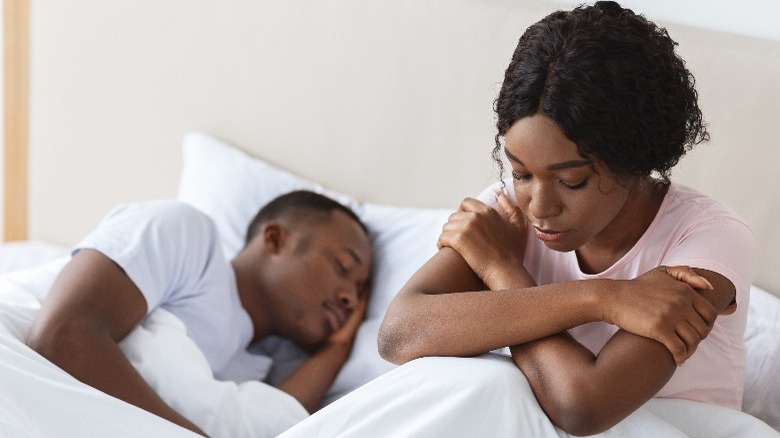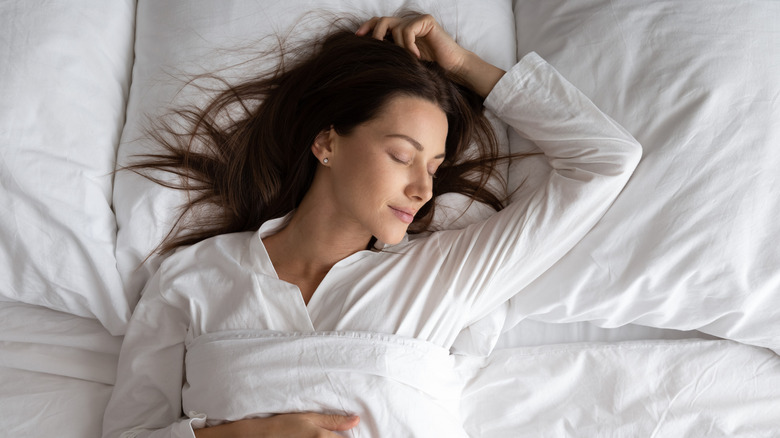Sleeping Separately From Your Partner Isn't Wrong (And Don't Let Your Friends Tell You Otherwise)
Even though we're not conscious of it, sleep is one of the most critical activities we engage in during our lives. Sleep can be a replenishing, joyful activity – few moments are quite as satisfying as tucking into a comfortable bed when you need some sweet, sweet zzz's.
But then, your partner comes bursting home late at night from their closing shift. Perhaps instead, they're waking up at the brink of dawn to get ahead of their morning commute. Maybe they run hot at night, and your shared bed becomes more like a furnace than a mattress. Or maybe they simply steal the covers as they toss and turn at night. Hopefully, your partner does not do all of these things at once. But even if one of these scenarios are true, it could have a negative impact on your sleep. Even if you have tried all the hacks to improve your quality of sleep, there is one possible solution that some couples might be afraid to consider: sleeping separately.
One in five couples sleep separately, according to research gathered by the International Housewares Association for The New York Times in January 2023. Couples sleeping apart is not a new phenomenon, though it might still entail some stigma. Are couples that sleep separately still attracted to each other, or having sex? Are couples that sleep apart having relationship issues? Are they just glorified roommates? And crucially: is sleeping separately worth it? Here's the breakdown on the bed breakup.
Why sleep apart?
While a number of couple quirks might contribute to the decision to sleep in separate beds, the most common is snoring or problematic sleep schedules, according to a Naturepedic poll of 800 people who do and do not sleep apart. Couples might also have health issues, such as a sleep disorder, that could make one restless or frequently wake from sleep. A difference in preferences such as temperature and mattress firmness could make sleeping a slog. And environmental factors, such as an excess of artificial light, or high noise levels, can also complicate sleep. Per Statista, the global sleep economy was worth $432 billion in 2019, as the tired among us seek slumber.
Making the choice to sleep separately is not without its nuance. Sleeping together is not obligatory for couples, but a construct that can be influenced by social factors. Sleep experts point to the advent of the coronavirus pandemic as one potential catalyst for separate sleep. Couples who now work from home could spend so much time together, that having their own spaces to rest becomes critical for the wellbeing of both themselves and their relationships. And with an increased awareness of the importance of mental health, and its essential connection to sleep, couples are prioritizing their sleep to prioritize their health and minds. And it appears to make a difference; the same Naturepedic poll states that 60% of separate sleepers are less stressed during the day than when they slept together.
Skeptics of separate sleeping
Sleeping in separate beds has in the past been termed "sleep divorce," a phrase that can be negative and stigmatizing. Clinical psychologist Dr. Shelby Harris tells Newsweek, "Sleeping separately is a normal, common, and healthy solution for a lot of couples out there who aren't getting the sleep they need." Other psychologists, however, might be suspicious of separate sleep. Clinical psychologist Dr. Cheryl Fraser tells The New York Times, "It's not a big leap from healthy solitude to a little bit of distance." Dr. Fraser's own research showed that, out of 3,000 long-term couples surveyed, between 33% and 40% are in a relationship void of sex. Initiating sex and intimacy could perhaps take some extra intention when sleeping apart in such cases, potentially placing further strain on the relationship.
Additional studies complicate the benefits of sleeping separately. More than 1,000 people were surveyed for a research study from the University of Arizona in 2022, which found that people who sleep together sleep for longer, had lowered depression, stress, and felt overall more satisfied with their relationships, compared to the opposite.
But there is a caveat when it comes to co-sleeping: even when couples do not sleep well together, they would still rather sleep snuggled up than alone, according to a study (via TED). This could mean that, in such circumstances, the psychological instinct for safety at night could be at odds with the physical need for sound sleep.
Benefits of sleeping apart
When your sleep is suffering, keep an open mind to possible solutions. Though it may seem unconventional at first, even some celebrity couples have slept in separate beds. Prioritizing your needs is essential, full stop. Sleeping separately does not need to beckon the end of your relationship or sex life, and personal anecdotes frequently cite the contrary. TikTok user Michelle Mouthis says in her video that sleeping separately from her boyfriend led to better rest, which might have led to more intimate moments than before. She asks viewers to consider what they are afraid of doing to benefit their relationships because others have labeled it "bad." TikTok user @mybabynvee says succinctly in her TikTok video: "You don't have to sleep next to your partner to be intimate, to be close, to have a good marriage."
And TikTok user Abigail, aka @downsideupgrade, says in her TikTok video that she and her husband made the choice to sleep in separate rooms to both replenish themselves and their relationship when their sleep behaviors were incompatible. "Strong emotional connections and physical intimacy are pretty much non-existent when we're cranky," she says. She points to the idea that, without good sleep, the rest of our responsibilities may suffer, causing unnecessary stress which could lead to tension between partners.
Trying new things does not have to be a permanent change, either; if sleeping separately does not work out, you could always see a sleep therapist or doctor for additional support.



